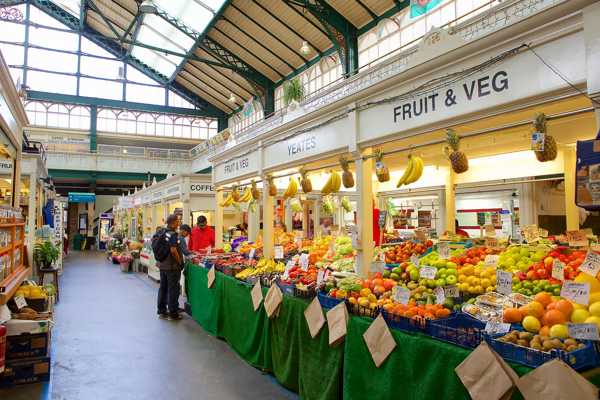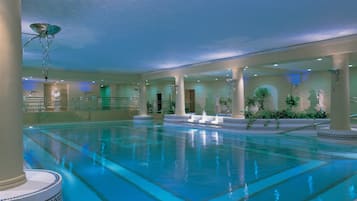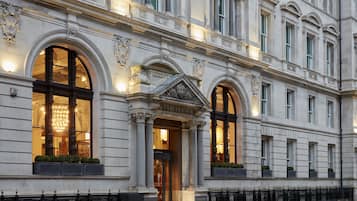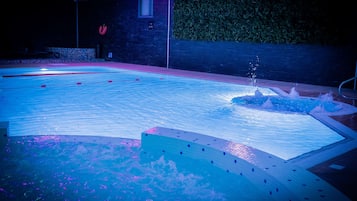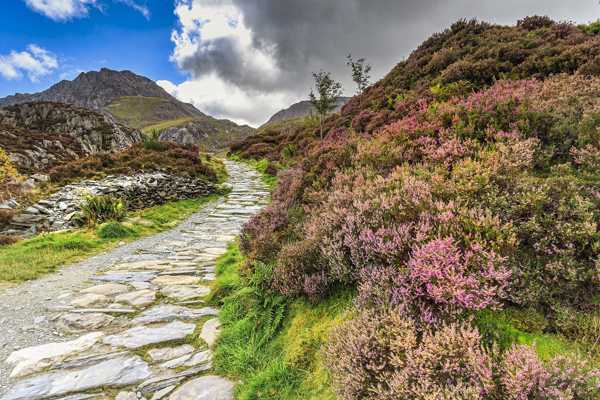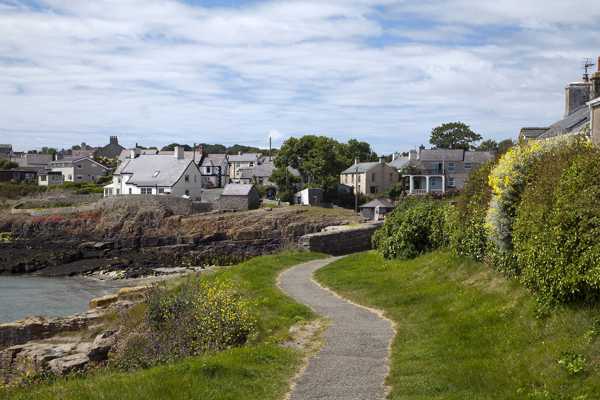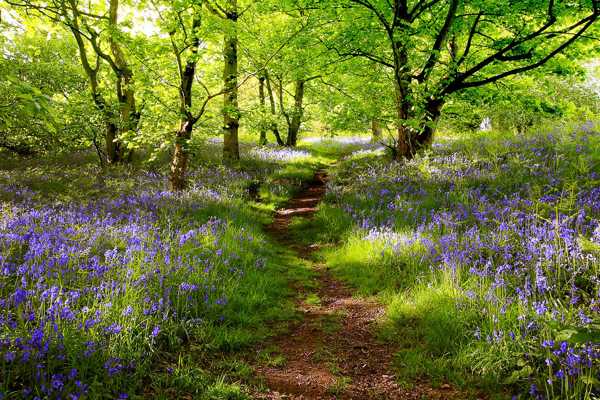A visit to any of Wales's picturesque islands brings peace, tranquillity, and a closer connection to nature. Many have been religious retreats for centuries, and you'll find ancient monasteries, moss-covered churches and prehistoric burial chambers to explore. The islands are also among the best places in Wales to spot sea birds like cormorants or puffins, along with seals, dolphins and whales in the surrounding waters.
Whether you're interested in an energetic hike around the coastline or just want to sunbathe and enjoy a pint of local beer with sensational views, we've got you covered. Relax and unwind in the country's most secluded spots with our guide to the very best islands in Wales.
- 1
Puffin Island
Protected wildlife habitat and breeding ground for numerous seabirds

- Familias
- Foto
As the name suggests, Puffin Island is a great place to go bird-spotting, as huge colonies of seabirds nest here in spring. While puffins (which gave the island its name) are quite scarce, there are large populations of razorbills, kittiwakes, oystercatchers and cormorants. In winter, the island is visited by a scattering of Canada geese and eider duck.
Boat trips leave daily from Beaumaris in spring and summer, passing by sea caves dotted around the island's coastline. You might even spot grey seals sunbathing on the rocks or harbour porpoises feeding in the straits. You’ll also pass the Penmon Point Lighthouse, with onboard guides providing commentary on the local history and wildlife.
Mapa - 2
Holy Island
Tour the religious and historic relics

- De aventura
- Familias
- Historia
- Foto
Holy Island takes its name from its high numbers of archaeological sites, burial chambers and standing stones. Highlights include Trefignath burial chambers, Bronze Age standing stones at Tŷ Mawr, and the remains of a Roman fort at Caer Gybi. Take a stroll through the old town of Holyhead for more period buildings, intriguing little boutiques and cosy cafes.
The beaches on the west coast of the island have very soft sand, great for building sandcastles or a relaxing stroll at sunset. Keen hikers will enjoy the coastal path that runs along the cliffs. There are also golf courses, horse riding centres, and the chance to go fishing in a former quarry.
Mapa - 3
Llanddwyn Island
A romantic island named after the Welsh patron saint of lovers

- De aventura
- Parejas
- Historia
- Foto
To get to Llanddwyn Island, you only need to wait until it’s low tide to stroll across the sand and reach its winding stone steps. Explore this island's interesting historical buildings, which include 2 Victorian lighthouses, a row of old pilot's cottages, and the remains of 16th-century St. Dwynwen's Church. In summer, winding footpaths will take you past fields of wild bluebells and yellow-horned poppies, and grazing flocks of Soay sheep.
The island's cliffs are home to cormorants, shags and oystercatchers. Wading birds like turnstones and sandpipers often fish in the surrounding sea. The soft sandy beaches on either side of Llanddwyn offer breathtaking views across the water to the mountains of Snowdonia National Park.
Mapa - 4
Bardsey Island
Ancient religious ruins and eye-catching avian residents

- De aventura
- Económico
- Historia
- Foto
Legend has it that 20,000 saints are buried on Bardsey Island, and for centuries it was the endpoint of pilgrimages from across Britain. Archaeologists have uncovered more than 40 prehistoric sites, and the remains of the 13th-century abbey are still visible in the churchyard. Hiking paths take you past a 19th-century lighthouse and up to the peak, where you can enjoy spectacular views of the coast.
Bardsey is home to a substantial breeding colony of Manx shearwater, puffins, choughs and oystercatchers – you can learn more at the Bardsey Bird and Field Observatory. There's a small beach where you can swim in the crystal blue seas, though you may have to share space with the local grey seals.
Mapa - 5
Ramsey Island
Fishing, whale-watching and adorable baby seals

- De aventura
- Económico
- Familias
- Grupos
- Foto
Ramsey Island is a protected haven for seabirds like kittiwakes and choughs as well as peregrines and buzzards. The large population of Atlantic grey seals means hundreds of seal pups are born on the island every autumn. The best way to see them is on a boat trip, which sails through narrow rock gorges to get close to the caves and beaches.
Other boat trips around the island will take you fishing for mackerel or bass, or head further out to sea to spot dolphins, porpoises, fin whales and leatherback turtles. Ramsey Island's 3.5-mile hiking trail provides stunning views of the Pembrokeshire coastline and Skomer Island. On a clear day, you can even see the west coast of Ireland.
Mapa - 6
Skokholm
A tiny island with diverse birdlife and wildflowers

- Foto
The tiny Skokholm Island is part of the Skomer Marine Nature Reserve. It supports large populations of storm petrels, puffins and Manx shearwater, as well as a beautiful display of wildflowers. Risso’s dolphins, harbour porpoise and Atlantic grey seals can often be spotted in the water around the island.
As day trips to Skokholm are uncommon, you’ll see very few people, but there are several cottages and farm buildings available for overnight stays. Great for getting away from it all, birdwatchers, wildlife enthusiasts and budding hermits will appreciate the peaceful seclusion.
Mapa - 7
Grassholm
An enormous gannet colony gives the island a white 'halo'

- Foto
One of Wales' most remote islands, Grassholm is a tiny lump of rock 11 miles off the coast of Pembrokeshire. It's home to an incredible 39,000 pairs of gannets, which make up 10% of the world’s gannet population. Every spring, the air is thick with these seabirds as they return to the island to breed.
For the protection of the birds, people aren't allowed to land on the island, but boat trips can get you close enough to see this remarkable phenomenon. Watch the gannets as they plunge into the sea to catch fish or swoop over the high cliffs. The best time to visit is in early June when chicks start to hatch.
Mapa - 8
Caldey Island
A holy island that's a haven of peace and calm

- De aventura
- Familias
- Historia
- Foto
There have been monks on Caldey Island on and off since the 6th century, though the current Cistercian monastery wasn't built until the early 20th century. Monastic services at the abbey are open to visitors, and there are numerous other religious sites to explore like the unusual stained-glass windows of St David's Church or the imposing wooden crucifix outside Watchtower Chapel.
Wander around the woods and you'll see a thriving red squirrel population, reintroduced to the island in 2016. Kids will love feeding the black swans, French partridge and barnacle geese that swim around the medieval village pond. The Abbey also has a small chocolate factory that produces bars of delicious and handmade chocolate.
Mapa - 9
St Catherine's Island
Once used as a defence from the Napoleonic wars to WWII

- Historia
- Foto
St Catherine's is a tidal island across the water from Tenby that has been used as a military defence for centuries. A fort was built here during the Napoleonic Wars to repel the French invasion – today, the main gun deck and casements are open for visits. Explore the main deck during the day for short films and illustrated talks on the history of the fort and the island.
Access to St Catherine's Island is across the sand at low tide and up a series of steep, winding steps leading up to the WWII gun emplacement. From the top of the island, you can enjoy panoramic views of Carmarthen Bay and unparalleled views of Tenby and the mainland.
Mapa - 10
Flat Holm
Old wartime fortifications and Wales' most southerly pub

- De aventura
- Económico
- Historia
- Foto
- Exótico
Through its long history, Flat Holm has been home to everyone from meditating medieval monks to smugglers hiding bottles of brandy. Visible historical remains include Victorian and WWII gun emplacements and a crumbling old sanatorium. There's also a small monument to Guglielmo Marconi, who sent the first radio message from the island in 1897.
Take a walk through the tall stands of wild leek, or hunt down the rare wild peony, which only grows on Flat Holm and neighbouring Steep Holm. The old barracks houses a small museum with some interesting Neolithic artefacts, a shop full of fair-trade snacks, and a pub, the Gull and Leek, where you can try a range of local beers and ciders.
Mapa - 11
Skomer Island
Meet puffins and porpoises in Pembrokeshire

- Familias
- Foto
Salty Skomer Island is a fragment of rugged rocks that sits just a stone's throw off the gorgeous Pembrokeshire coastline. You can come to see it rising from St. George's Channel on the headlands of Deer Park. Or you can hop on a boat tour and get up close and personal, to catch glimpses of proud puffins and basking seals on the shoreline of the isle.
During the summer, only 250 people can land on Skomer each day. Others will stay on the water and look for shearwaters, gannets, porpoises, and dolphins from the waves. Things are particularly spectacular in the spring when groups of daffodils sway on Skomer's breezy clifftops.
Mapa - 12
Worms Head
Cross only when the tide allows

- Económico
- Foto
Worms Head is a pinnacle on the Gower Peninsula. It's a rugged rock that juts into the Atlantic Ocean a short walk from the village of Rhossili, around 40 minutes' drive from Swansea. If you've come to Wales for those famous snapshots of a natural coast, this one's certainly for you.
The Worm stretches a little over a mile from end to end. It's technically a tidal island, which means you can only explore when the water is sufficiently low. There's a dedicated lifeguard station by the start of the trail where you can check if it's safe. If it's possible, you'll cross a swathe of murky seaweed pools and climb a high cliff where seals are often the only company.
Mapa


